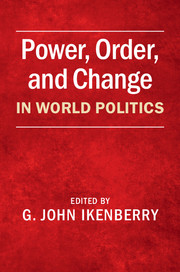Book contents
- Frontmatter
- Table of contents
- Contributors
- Acknowledgments
- Introduction: power, order, and change in world politics
- Part I Varieties of international order and strategies of rule
- Part II Power transition and the rise and decline of international order
- Part III Systems change and global order
- Index
- References
Introduction: power, order, and change in world politics
Published online by Cambridge University Press: 05 September 2014
- Frontmatter
- Table of contents
- Contributors
- Acknowledgments
- Introduction: power, order, and change in world politics
- Part I Varieties of international order and strategies of rule
- Part II Power transition and the rise and decline of international order
- Part III Systems change and global order
- Index
- References
Summary
Introduction
The global system is in the midst of a great transformation. The distribution of power is shifting. Great powers are rising and declining. For almost a century, the United States dominated world politics. But today, China and other rising non-Western states, such as India and Brazil, are growing in wealth, power, influence, and ambition. The old order – led by the United States and its allies – is still a commanding presence in the global system. But the power once concentrated in the hands of the United States is diffusing outward and, as a result, new struggles are emerging over global rules and institutions. In the midst of these changes, scholars have been asking basic questions about the logic and character of contemporary international order. How profound is the change that is underway in global order? If the United States is losing its position of preeminence, will the order that it created weaken and break apart, giving way to a new type of global order? Or will non-Western rising states ultimately become stakeholders in the existing order? Do rising states want great authority and privileges in the existing international order or do they want to use their growing power to reorganize the basic principles and norms of the system?
The struggles underway today over international order are, of course, not new. The rise and decline of great powers and convulsive shifts in international order have played out many times over the centuries. In past eras, states have risen up, fought wars, and built international order. Spain, France, Great Britain, Germany – each of these states grew in power in a past century and made a bid to dominate Europe and the wider world. In turn, each declined or was defeated in war, triggering a renewal of geopolitical struggle over leadership and the organizing rules and arrangements of global order. Over the centuries, the actors on the global stage have changed but the scripts and plot lines of struggle over order have appeared and reappeared many times. As a result, scholars are asking questions about the past. Are there recurring historical dynamics and patterns that can help us understand today’s power transitions and struggles over international order? What can we learn from the past? Is the past prolog?
- Type
- Chapter
- Information
- Power, Order, and Change in World Politics , pp. 1 - 16Publisher: Cambridge University PressPrint publication year: 2014
References
- 6
- Cited by



